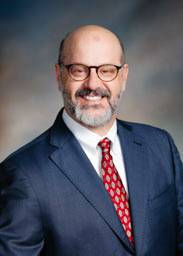As a physician who has been involved in medical education almost his entire career, Dr. Thomas Hunt jumped at the opportunity to join and help shape a new Southern Nevada medical school four years ago. As chair in the Roseman University College of Medicine and director of Valley Health System Family Medical Residency program, he has a hand in ensuring that the area's doctor shortage is addressed over the next several years. According to the Association of American Medical Colleges 2017 State Physician Workforce Data Report, Nevada ranked 48th in the country for active primary care physicians per capita. The Valley Health System's newly accredited Family Medicine Residency Program was created to address this disparity and increases Nevada's Family Physician residency training slots by 33%.
Describe your medical specialty and why it's vital for our community.
Family physicians are the backbone of the health care physicians in the United States and are present in every community, filling niches in both urban and rural America. The specialty of family medicine evolved from general practitioner Marcus Welby, providing medical care regardless of one's age and medical condition. It's a specialty of breadth where we have to be familiar with 90% of the diseases that come through the door and feel comfortable taking care of all aspects, such as pregnant women, the elderly and all in between. The training is very broad-based and programs include specialties such as pediatrics, adult medicine, surgery, obstetrics and gynecology.
More Americans depend on family physicians than on any other medical specialty. The program will help alleviate the family physician shortage in Nevada and has been designed to retain these doctors in our community.
When did you know you wanted to be a doctor?
I knew I wanted to be a doctor when I was in high school, looking for a challenging profession to provide a real difference for people. During medical school, I enjoyed every aspect of medicine. I liked using my hands in surgery, working with kids, solving puzzles of medical mysteries, and was fascinated by the brain and how it affected overall mental health. Family medicine covers such a wide range of health care for people that you know you can go to any community in the world and be of assistance.
What is the most important part of your job?
To create an environment for future medical students to train and also provide an answer to our physician workforce shortage in the U.S. Creating a strategic partnership with the Valley Health System, the College of Medicine is sharing resources to make the Family Medicine residency a reality. The three-year program focuses on primary care and preventive medicine and will include training in both outpatient clinics and hospitals. We started in July with our first 10 residents for a three-year training program, and soon we hope to have 30 physicians in the program. Through this collaborative effort, residents will rotate through Roseman Medical Group, Southwest Medical outpatient clinics and the Spring Valley and Summerlin Hospitals.
You've practiced medicine in both rural areas and big cities. Other than the obvious, how do they compare and do you have a preference of living in a small or larger community?
After I completed my residency program with the National Health Service Corps, I was placed in rural upstate New York and was a solo physician, and the only doctor for approximately 20 miles. I had the opportunity to care for everybody in my community which included making house calls, delivering babies, treating patients suffering from heart attacks, intensive care, and being the school physician. While it was demanding, it was very gratifying. When I first moved to Las Vegas 20 years ago, I was surprised and shocked that the access to medical care in Las Vegas was worse than the rural county I was previously practicing in, such as a long wait to see a specialist and that many services were unavailable in the state. It is much better now, but there is still a lot of work to be done.
What challenges come with the local health care industry, on both sides of the stethoscope?
The biggest challenge is access to care on both the primary and specialty care side, such as that patients who get discharged from hospitals have to wait weeks to see follow-up doctors. We are underresourced and doctors are working late hours and long weekends to meet the demand.
What's the best professional advice you've received or given?
The advice I give to young physicians is to follow your heart and passion. There many areas of need throughout our community; if you stay true to yourself, you can make a difference and be happy with your choices.
I get a lot of joy from giving back to community and volunteering with Volunteers in Medicine. It leads to greater joy in my work and truly makes a difference. I strongly recommend individuals in our community do the same.
How might an overhaul of health care at the federal level affect what you do?
As a family doctor, it is about caring for the people in front of you, and there is always a need for individuals to receive primary care. The physician/patient relationship will never change.
What is something that people might not know about you?
I am a tournament poker player.

